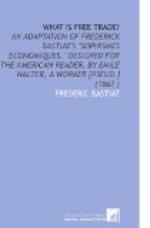BALANCE OF TRADE.
Our adversaries have adopted a system of tactics, which embarrasses us not a little. Do we prove our doctrine? They admit the truth of it in the most respectful manner. Do we attack their principles? They abandon them with the best possible grace. They only ask that our doctrine, which they acknowledge to be true, should be confined to books; and that their principles, which they allow to be false, should be established in practice. If we will give up to them the regulation of our tariffs, they will leave us triumphant in the domain of literature.
It is constantly alleged in opposition to our principles, that they are good only in theory. But, gentlemen, do you believe that merchants’ books are good in practice? It does appear to me, if there is anything which can have a practical authority, when the object is to prove profit and loss, that this must be commercial accounts. We cannot suppose that all the merchants of the world, for centuries back, should have so little understood their own affairs, as to have kept their books in such a manner as to represent gains as losses, and losses as gains. Truly it would be easier to believe that our legislators are bad political economists. A merchant, one of my friends, having had two business transactions, with very different results, I have been curious to compare on this subject the accounts of the counter with those of the custom-house, interpreted by our legislators.
Mr. T dispatched from New Orleans a vessel freighted for France with cotton valued at $200,000. Such was the amount entered at the custom-house. The cargo, on its arrival at Havre, had paid ten per cent. expenses, and was liable to thirty per cent. duties, which raised its value to $280,000. It was sold at twenty per cent. profit on its original value, which equalled $40,000, and the price of sale was $320,000, which the consignee converted into merchandise, principally Parisian goods. These goods, again, had to pay for transportation to the sea-board, insurance, commissions, &c., ten per cent.; so that when the return cargo arrived at New Orleans, its value had risen to $352,000, and it was thus entered at the custom-house. Finally, Mr. T realized again on this return cargo twenty per cent. profits, amounting to $70,400. The goods thus sold for the sum of $422,400.
If our legislators require it, I will send them an extract from the books of Mr. T. They will there see, credited to the account of profit and loss, that is to say, set down as gained, two sums; the one of $40,000, the other of $70,400, and Mr. T feels perfectly certain that, as regards these, there is no mistake in his accounts.
Now what conclusion do our Congressmen draw from the sums entered into the custom-house, in this operation? They thence learn that the United States have exported $200,000, and imported $352,000; from whence they conclude “that she has spent, dissipated, the profits of her previous savings; that she is impoverishing herself and progressing to her ruin; and that she has squandered on a foreign nation $152,000 of her capital.”




